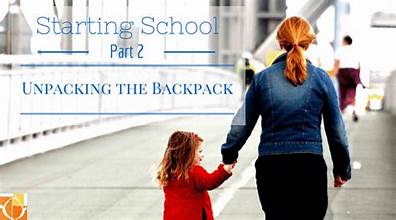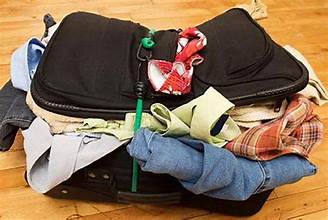In today’s fast-paced world, the pressures and challenges we face seem to be growing with each passing day. Life feels like an overwhelming weight, like an overstuffed backpack NYT, crammed with worries, responsibilities, and expectations. This metaphorical weight has become an all-too-familiar sensation for many, and it has been explored in depth by The New York Times in various articles. As our lives become increasingly complex, how do we navigate this “overstuffed” feeling? This article delves into this concept and examines the ways in which modern life can sometimes feel too heavy to bear, using the metaphor of the overstuffed backpack.
Table of Contents
The Weight We Carry: Like an Overstuffed Backpack NYT
Life often feels like a journey, and in this journey, we carry our emotional, physical, and mental baggage. An overstuffed backpack is a perfect representation of the weight many people feel when trying to juggle the various demands of modern living. In a New York Times article, it was pointed out that many individuals today experience heightened levels of stress and anxiety due to the pressures they face. These pressures come from different sources: career expectations, family obligations, financial worries, and even societal standards. The result? We often feel burdened, like an overstuffed backpack NYT, filled with everything we can’t seem to put down.
In a figurative sense, this backpack contains not only our to-do lists but also our worries about the future, the weight of the past, and the constant balancing act between work and personal life. The metaphor of like an overstuffed backpack NYT captures how overwhelming and exhausting it can be to carry these heavy loads, often without an outlet for relief.
The Emotional Load: Managing Stress and Anxiety
The emotional toll of living with a metaphorical backpack can be significant. Many people report feeling stressed, anxious, and at times, paralyzed by the constant juggling of responsibilities. The weight of worry, particularly in uncertain times, can be relentless. As highlighted in a New York Times piece, the sensation of carrying “everything” all at once leads to burnout and can significantly affect mental health.
The metaphor of like an overstuffed backpack NYT is apt because, much like a physical backpack, the mental and emotional load can become unbearable over time. With too much packed inside, there comes a breaking point. People are less likely to handle their daily stress in healthy ways when their mental backpacks are too full. The first step in alleviating this burden is acknowledging the weight we are carrying and beginning to unpack it, piece by piece.
Social Expectations and the Pressure to Perform

Another layer of the overstuffed backpack is the constant pressure to meet societal standards. From social media to workplace environments, there is an increasing expectation to perform, appear perfect, and be constantly productive. This idea of being “always on” can leave us feeling stretched thin, like an overstuffed backpack NYT, as we try to meet the expectations of others, often at the expense of our own well-being.
The drive for success and the quest for external validation can turn our lives into an endless cycle of striving, where we pack more into our proverbial backpacks in pursuit of personal achievements and societal approval. The problem arises when the weight of these external pressures becomes too much to carry, and individuals begin to lose sight of their own needs and desires.
As discussed in a New York Times article, it is essential to draw boundaries and identify when we are overcommitting ourselves. Being mindful of our limits can help prevent the backpack from becoming overloaded. Taking time to reflect on personal values and priorities can help us unpack the weight we are carrying and focus on what truly matters.
Technology and the Digital Backpack
In recent years, the rise of digital technology has added another layer to the metaphor of like an overstuffed backpack NYT. With the constant stream of notifications, emails, and messages, the digital world has become an ever-present companion. While technology brings convenience, it also contributes to the overwhelming feeling of carrying too much. Our digital lives are full of reminders, appointments, and virtual demands, making it difficult to unplug and take a break.
The constant need to be “connected” can feel like carrying an invisible backpack that never goes away. The weight of the digital world is ever-present, contributing to the sense of being overburdened. As the New York Times has noted in various articles, our increasing dependence on technology is part of what leads to burnout and feelings of inadequacy.
To manage this new kind of weight, it’s important to set boundaries with technology, taking breaks from the constant buzz and prioritizing face-to-face interactions. Just as you would lighten the load of a physical backpack by taking out unnecessary items, it’s important to declutter your digital life by reducing distractions and focusing on what brings you peace and purpose.
The Importance of Self-Care and Mental Health
Amid all the stresses and burdens, one of the key recommendations to manage like an overstuffed backpack NYT is to prioritize self-care. Often, people neglect their own needs because they are too busy managing the external pressures and responsibilities of life. However, in order to alleviate the weight of the backpack, it is essential to take time to rest, recharge, and tend to one’s mental health.
Self-care comes in many forms: physical exercise, meditation, journaling, or simply taking time off to relax. The New York Times has written extensively about the importance of setting aside time for self-care, especially in a world that demands constant action. When we neglect our own well-being, we only add to the weight of the backpack, making it harder to carry. Therefore, learning to care for oneself is a key strategy in managing the load.
By adopting healthy coping mechanisms and allowing ourselves permission to rest, we can reduce the weight of the metaphorical backpack and find greater balance in our lives. Recognizing when we need a break and taking steps to lighten our load is a crucial part of maintaining mental health.
The Benefits of Letting Go: Unpacking the Backpack

An important aspect of dealing with like an overstuffed backpack NYT is learning to let go of what we no longer need. Whether it’s outdated goals, unnecessary possessions, or toxic relationships, simplifying our lives can lighten the burden we carry. Many individuals have found that decluttering their physical and emotional spaces leads to a greater sense of freedom and peace.
The concept of “letting go” is often emphasized in New York Times articles that explore the connection between minimalism and well-being. By removing items or thoughts that no longer serve us, we free ourselves from the weight that is holding us back. This process of unloading can lead to greater clarity, focus, and a renewed sense of purpose.
Letting go doesn’t mean abandoning responsibilities, but rather, it’s about shedding the unnecessary weight that makes life feel heavier than it needs to be. When we focus on what truly matters, we can ease the burden of an overstuffed backpack and move forward with greater confidence and ease.
Reframing Our Perspective: Embracing the Journey
Instead of seeing life as a burden, like an overstuffed backpack NYT encourages us to reframe our perspective and embrace the journey. While the weight we carry may sometimes feel overwhelming, it’s important to recognize that every step we take is part of a larger narrative. Our experiences, struggles, and growth all contribute to the person we are becoming.
In many New York Times articles, writers highlight the importance of reframing challenges and seeing them as opportunities for growth. While the backpack may be heavy at times, the journey is what shapes us. Learning to appreciate the process rather than focusing solely on the weight can lead to a more fulfilling and less stressful life.
Also read Thespark Shop Flower Style Casual Men Shirt: The Perfect Blend of Comfort and Style
Conclusion: Unpacking the Backpack, Step by Step
Life will always have its challenges, and the metaphor of like an overstuffed backpack NYT perfectly captures the overwhelming weight we sometimes feel. Whether it’s the pressure of work, family, or societal expectations, it’s easy to feel burdened by the demands of life. However, by practicing mindfulness, setting boundaries, prioritizing self-care, and learning to let go of unnecessary weight, we can begin to lighten the load.
The journey is not about carrying everything at once, but about finding balance and letting go of what no longer serves us. As we navigate the complexities of life, it’s important to remember that we don’t have to carry the weight alone. Taking small steps to manage the metaphorical backpack can make all the difference, allowing us to move through life with greater ease and purpose.


